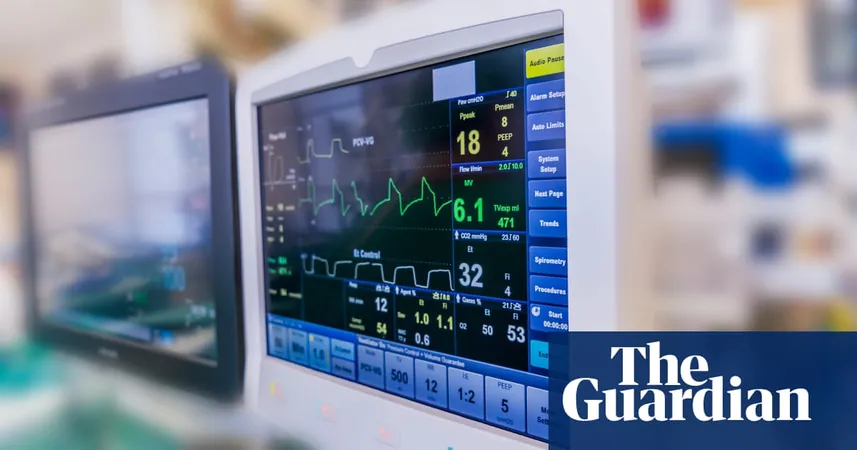
NHS Pioneers Revolutionary AI Tool to Predict Type 2 Diabetes Risk Years in Advance!
2024-12-23
Author: Wei
NHS Pioneers Revolutionary AI Tool to Predict Type 2 Diabetes Risk Years in Advance!
The National Health Service (NHS) in England is set to make headlines with a groundbreaking trial of an innovative artificial intelligence tool that promises to identify individuals at risk of type 2 diabetes as much as 13 years before the disease manifests. This initiative marks a significant leap forward in preventive healthcare and positions the NHS at the forefront of a global health revolution.
Understanding Type 2 Diabetes
Type 2 diabetes is a burgeoning concern, with over 500 million people affected worldwide. With estimates predicting this number could skyrocket to 1 billion by 2050, early detection is critical. The condition, which has numerous severe complications including blindness, kidney failure, heart attacks, strokes, and amputations, is often linked to obesity, inactivity, or genetic predisposition. However, not all individuals diagnosed fall into these typical categories, highlighting the urgent need for advanced predictive tools.
How the AI Tool Works
This cutting-edge AI technology scrutinizes electrocardiogram (ECG) readings collected during routine heart scans. It harnesses sophisticated algorithms to detect subtle changes that are often imperceptible to the human eye. Identifying these early warning signs could allow healthcare providers to implement proactive measures, enabling patients to make lifestyle or dietary adjustments that could prevent the progression to type 2 diabetes.
The Anticipated Trial
The anticipation surrounding the trial, scheduled to commence in 2025 at the Imperial College Healthcare NHS Trust and Chelsea and Westminster Hospital NHS Foundation Trust, is palpable. As the first healthcare system globally to adopt this technology, the NHS aims to serve as a model for other countries eager to integrate such innovative practices into their own health systems.
Development of the Tool
Developed by a talented team led by Dr. Fu Siong Ng and Dr. Arunashis Sau at Imperial, the AI tool—dubbed the AI-ECG Risk Estimation for Diabetes Mellitus (Aire-DM)—was trained on an extensive dataset comprising 1.2 million ECG scans. This immense body of data, coupled with findings from the UK Biobank—which holds genetic and health records of over 500,000 individuals—validates the tool's capability to detect minute, impactful changes in ECG readings.
Identifying Early Warning Signs
These remarkable signs include variations in the heart’s electrical signal patterns, such as timing anomalies and changes in the shape and structure of electrical waves. The tool can also identify extended electrical activation times and irregularities in the heart’s signal resetting process, potentially highlighting the early effects of diabetes on heart health, long before any symptoms arise.
Accuracy of Predictions
Initial tests indicate that the AI tool accurately predicts diabetes risk approximately 70% of the time across diverse demographics, including age, gender, ethnicity, and socioeconomic background. When these AI-generated predictions are combined with existing genetic and clinical data, such as age and blood pressure, the accuracy improves significantly, presenting a robust risk profile for patients.
Expert Opinions
Prof. Bryan Williams, Chief Scientific and Medical Officer at the British Heart Foundation, which played a pivotal role in funding this innovative research, remarked on the transformative potential of this technology. “This exciting research harnesses the power of artificial intelligence to analyze ECGs, revealing insights that traditional methods often miss,” he explained. “Such advancements could dramatically change the way we predict the risk of developing type 2 diabetes long before the onset of the condition.”
A Beacon of Hope
With the increasing prevalence of type 2 diabetes and its associated risks, the promise of early intervention provided by Aire-DM offers a beacon of hope. As the NHS embarks on this pioneering journey, the health community eagerly awaits the results, which could redefine standards of care and prevention in diabetes management across the globe. Are we on the brink of a diabetes crisis, or will this AI tool be the key to reversing the trend? Stay tuned!


 Brasil (PT)
Brasil (PT)
 Canada (EN)
Canada (EN)
 Chile (ES)
Chile (ES)
 Česko (CS)
Česko (CS)
 대한민국 (KO)
대한민국 (KO)
 España (ES)
España (ES)
 France (FR)
France (FR)
 Hong Kong (EN)
Hong Kong (EN)
 Italia (IT)
Italia (IT)
 日本 (JA)
日本 (JA)
 Magyarország (HU)
Magyarország (HU)
 Norge (NO)
Norge (NO)
 Polska (PL)
Polska (PL)
 Schweiz (DE)
Schweiz (DE)
 Singapore (EN)
Singapore (EN)
 Sverige (SV)
Sverige (SV)
 Suomi (FI)
Suomi (FI)
 Türkiye (TR)
Türkiye (TR)
 الإمارات العربية المتحدة (AR)
الإمارات العربية المتحدة (AR)